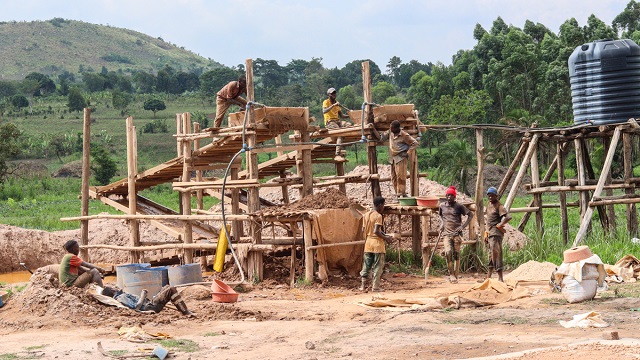
Opaque oil contracts and mysterious gold export data dent EITI validation performance
ANALYSIS | RONALD MUSOKE | With a score of 78.5 points out of a possible 100, Uganda has been commended by the Oslo-based Extractive Industries Transparency Initiative (EITI) Board following a recent validation of the country but, persistent issues surrounding transparency in the disclosure of oil and mining contracts as well as discrepancies in gold production and export data affected its overall score.
Uganda’s validation score published by the EITI Board on May 21 was based on the implementation of the 2019 EITI standard. According to the EITI validation classification, a score of 0 – 49 is categorised as “low”; 50 – 69 is “fairly low,” 70 – 84 is ranked as “moderate,” 85 – 92 is classified as high, while 93 – 100 is very high.
According to the Board, Uganda’s overall score reflects an average of three component scores on stakeholder engagement, transparency, and outcomes and impact. Uganda’s highest score (85 points) was registered on the component of “outcomes and impact” and the EITI commended the Uganda National EITI Secretariat (UGEITI) for its outreach efforts (publishing reports and carrying out dissemination activities in oil and mining regions).
Uganda also registered a score of 82.5 points on stakeholder engagement following UGEITI’s rallying of stakeholders from government agencies, oil and mining companies as well as civil society (EITI multi stakeholder group) to routinely work and agree on key documents such as work plans, annual progress reports, as well as disseminating and debating the findings. However, on the transparency component, Uganda scored 67.5 points owing to among other issues “unexplained discrepancies in gold mining and processing data.”
“I commend Uganda for establishing a robust multi-stakeholder platform that facilitates public engagement and data-driven debate,” said Helen Clark, the EITI Board Chair.
“Building on a strong foundation for sector governance, stakeholders should prioritise concrete measures to disclose oil, gas, and mining agreements and beneficial ownership information.” Clarke further noted that safeguarding the broader civic space will also be crucial to sustain transparent and accountable governance of natural resources in Uganda.
The EITI is an international standard that is intended to promote openness and accountability when it comes to management of oil, gas and mineral resources around the world. Uganda, which is an emerging oil and gas producer, joined the EITI in 2020 with the lofty objective of improving transparency and accountability in the oil, gas and mining sector to enhance public trust, improve the investment climate and strengthen revenue collection.
Reactions to EITI score
Siragi Magara, the Energy and Extractives Industries Coordinator at Oxfam-Uganda who also doubles as civil society representative on Uganda’s EITI Multi Stakeholder Group told The Independent on May 31 that considering this was the first ever validation exercise for Uganda, the country actually did very well. “We are still infants in the EITI process and much of the work being done is still in its formative stage and that might speak to our moderate score,” he told The Independent.
Still, Magara points to contracts disclosure issue being the main challenge affecting transparency in the country’s extractives industry. He says the oil and gas production sharing agreements need to be made public and the civic space which the government has been tightening to be eased.
Don Bwesigye Binyina, the executive director of the Africa Centre for Energy and Mineral Policy (ACEMP) also told The Independent on May 29 that the report is spot on about gold requiring more due diligence, especially smuggled gold from across the borders. “The fact that we don’t have proper documentation on the gold mining sector remains a contentious issue,” he said.
Onesmus Mugyenyi, the deputy executive director of the Advocates Coalition on Development and Environment (ACODE), a Kampala-based public policy thinktank told The Independent that although “some good work has been done by UGEITI (Uganda National EITI Secretariat), contract transparency and availability needs to be improved.
“You cannot have a genuine discussion when people do not know what they are discussing,” he said, “If you say all the terms of these agreements are in this contract but the said agreements are not available to the public, then what you have negotiated with the companies is not known and what the people are discussing is purely speculation.”
Mugyenyi said while important details of oil companies such as TotalEnergies are known (physical address, websites, internal policies), the same case does not apply to the mining companies operating in the country.
“It is still difficult to know what kind of mining companies operate in Uganda; and where exactly to find them; they hardly have physical addresses, and they have no websites,” he said.
Mugyenyi further noted that the Ministry of Energy and Mineral Development does not have publicly available information on the licensing regime in the country’s mining sector.
“We still don’t know who owns what licence and who has transferred which licence to who; that kind of information is not known,” he says, “This shows that there is, for instance, a lack of transparency in the way the mining of gold, refining and trading is done.”
Mugyenyi told The Independent that although Uganda has recently got off the “Grey List” of the Financial Action Task Force (FATF), the international anti-money laundering and terrorism financing watchdog, it does not mean that the country is insulated from getting back on that list.
He says there are a number of areas that Uganda should continuously work on and those areas are still under scrutiny. “In other words, they are blackspots and monitoring is continuing and if we are not seen to be making progress, the country can easily slide back onto the grey list,” he told The Independent.
“We see issues of beneficial ownership, disclosure of beneficial ownership information but also limited transparency in the way we manage our minerals, implying that actually there could be a lot of illicit financial flows or, that this country could be used as a transit route for illegal minerals or this country could be used to sanitise or “wash” otherwise what is referred to as conflict gold and we need to work on that.”
However, Binyina says there are indications to show that the government is working on a longlasting solution to challenges in the country’s gold industry. “There have been attempts to introduce a biometric registration of Uganda’s artisanal gold miners because gold is one of the major foreign exchange earners for the country but artisanal gold mining is one of the leakages through which illicit financial flows manifest.”
“There has also been progress towards promotion of medium and large scale gold mining operations and that is why we have the likes of Wagagai Mining (U) Ltd in eastern Uganda; a national mining company has also been mooted to manage the commercial interests of the state. These are all positive steps aimed at formalising the country’s gold industry.
On traceability of gold, Binyina says, the government has ratified the regional ICGLR (International Conference on the Great Lakes Region) certification mechanism to regularise the export of the 3Ts and gold in the Great Lakes region. “If we secured a score of 78% without all these processes in place, Uganda’s next assessment will be better,” he told The Independent.
It’s a fair score
Gloria Mugambe, the head of the Uganda National EITI Secretariat (UGEITI) told The Independent that although there were areas where UGEITI differed in opinion from the validators in the EITI Board’s assessment of the data and the analysis, overall, UGEITI considers this to be a fair score for a first validation.
“We have not received any surprises from the validation assessment. The areas highlighted as areas for improvement have been on the radar even before we joined EITI,” she said, “Our first and second reports have singled out these same areas, and they are part of the recommendations that come out of these reports.”
Mugambe told The Independent that the issue surrounding contract transparency is one that requires continuous dialogue and follow up. She says the multi stakeholder group’s legal and contracts committee has developed a road map to contract transparency.
“The government is committed to contract disclosure and the companies have also indicated the willingness to disclose,” she said.
Beneficial Ownership data
Going forward, Uganda will have to disclose the beneficial, as well as legal owners of all corporate entities that apply for or hold a participating interest in oil, gas or mining licenses, according to the EITI Board.
This includes disclosing financial information and regulatory frameworks related to activities of state-owned enterprises in the mining sector. It also includes detailed reporting of fund transfers, retained earnings, reinvestment, third-party financing arrangements and loans.
The government should also disclose their prevailing rules and practices and loans or loan guarantees to mining, oil and gas companies. These disclosures should cover all expenditures that could be considered quasi-fiscal, such as payments for social services, public infrastructure, subsidies and national debt servicing, among others, undertaken outside of the national government budgetary process.
Within the mining sector, the EITI Board has also tasked Uganda to publish estimates of informal mineral exports volumes and values, in order to fulfil the objective of providing a basis for addressing export related issues in the mining sector. It is recommended that the government entities comprehensively disclose and harmonise export data.
Uganda is also encouraged to describe the methods for calculating export volumes and values and disaggregating by projects and regions. It should also ensure comprehensive disclosures of company payments and government revenues from oil, gas and mining disaggregated by company, revenue stream and government beneficiary, and by project.
The EITI Board has also urged Uganda to ensure the availability of funding for UGEITI in the mid to long term. “This is to ensure sustainability of the EITI in Uganda, including the feasibility of a national secretariat that continues to be well resourced while financially viable.”
Binyina told The Independent it is important for stakeholders to take the EITI International Secretariat’s report seriously because it is based on input from the government, the private sector and civil society and it can be used for benchmarking transparency, accountability and good governance of a country.
Mugambe says the EITI will continue to serve as a thorough diagnostic tool for Uganda’s extractive sector. “The new EITI Standard emphasises four key areas – energy transition, anti-corruption, revenue collection and gender and socio-environmental issues,” she said.
“UGEITI will continue to avail credible data on all these areas, as well as the operations of the mining sector and petroleum sector including their contribution to the Ugandan economy especially national content development and the artisanal and small-scale mining subsector.”
 The Independent Uganda: You get the Truth we Pay the Price
The Independent Uganda: You get the Truth we Pay the Price



